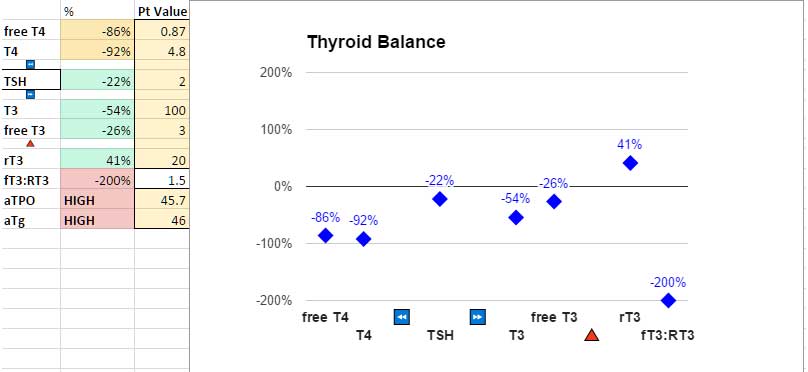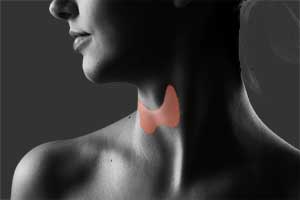Thyroid
![By National Human Genome Research Institute (NHGRI) from Bethesda, MD, USA (Thyroid Cancer) [CC BY 2.0 (http://creativecommons.org/licenses/by/2.0)], via Wikimedia Commons](/sites/default/files/Thyroid.jpg)
Thyroid disorders are increasingly prevalent and have a large impact on health affecting wide ranging areas including energy, mood, weight, and skin and hair quality.
Thyroid Balance
It has become standard recommendation to check TSH, and tell the person that they don't have a thyroid issue when it comes back normal. Unfortunately, that is very often not the case, and people suffer needlessly, sometimes for decades with a underactive thyroid that isn't reflected in the TSH levels.
Although an abnormal TSH proves thyroid dysfunction, a normal TSH does not mean a well functioning thyroid. The key to proper thyroid function is the appropriate balance between all the aspects of the thyroid regulation system. Even if all of your tests are within the normal range, the balance can be off and symptoms manifested.
At HNNH we encourage a comprehensive approach to both thyroid testing and treatment.

Using our Individualized Constitutional Medicinesm approach, we address the underlying causes and can help your thyroid regain its ability and begin to repair.
According to the American Thyroid Association:
- More than 12 percent of the U.S. population will develop a thyroid condition during their lifetime.
- An estimated 20 million Americans have some form of thyroid disease.
- Up to 60 percent of those with thyroid disease are unaware of their condition.
- Women are five to eight times more likely than men to have thyroid problems.
- One woman in eight will develop a thyroid disorder during her lifetime.
- Most thyroid cancers respond to treatment, although a small percentage can be very aggressive.
- The causes of thyroid problems are largely unknown.
- Undiagnosed thyroid disease may put patients at risk for certain serious conditions, such as cardiovascular diseases, osteoporosis and infertility.
- Pregnant women with undiagnosed or inadequately treated hypothyroidism have an increased risk of miscarriage, preterm delivery, and severe developmental problems in their children.
Common Symptoms of Hypothyroidism
- Fatigue
- Weakness
- Weight gain or difficulty losing weight (despite reduced food intake)
- Coarse, dry hair and dry skin
- Hair loss
- Sensitivity to cold
- Muscle cramps and aches
- Constipation
- Depression
- Irritability
- Memory loss
- Abnormal menstrual cycles
- Decreased libido
- Slowed speech (severe cases)
- Jaundice (severe cases)
- Increase in tongue size (severe cases)
You don't have to encounter every one of these symptoms to be diagnosed with hypothyroidism. Every patient's experience with the disorder is different. While you may notice that your skin and hair have become dry and rough, another patient may be plagued more by fatigue and depression. EndocrineWeb







